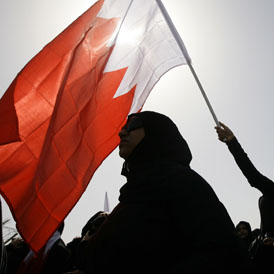Life sentences for Bahrain opposition activists
Eight opposition leaders are sentenced to life in prison in Bahrain. Human rights groups tell Channel 4 News the defendants were tortured and that the trials are “a travesty of justice”.
The National Safety Court – set up during emergency rule last March and presided over by a military judge without a jury – also sentenced 13 others to terms ranging from two to 15 years on various charges of sedition.
The authorities claim that those charged plotted to overthrow Bahrain’s Sunni rulers “by force and intelligence with a terror group colluding with a foreign country” – in an apparent reference to Iran.
Bahraini opposition activists deny any ties to Iran or the Iran-backed Lebanese group Hezbollah.
President of the Bahrain Centre for Human Rights Nabeel Rajab told Channel 4 News that all the defendants had been tortured.

“We know all of them were tortured. Some were electrocuted, some were beaten, and some were sexually abused,” he said.
Speaking from Manama, Rajab said the verdict was entirely political: “These people were targeted because of their views, it has shocked me that a government who talks about creating dialogue has abused these people because they simply expressed their views.”
We know all of them were tortured. Some were electrocuted, some were beaten, and some were sexually abused, Nabeel Rajab, Bahrain Centre for Human Rights
Human Rights Watch‘s Bahrain researcher Faraz Sanei told Channel 4 News from New York agreed that the court appears to operate as a military tribunal in everything but name.
“These trials do not conform to international standards for fair trials, they are a travesty of justice,” he said.
In a statement the Bahraini government denied that the trials were not fair, saying: “In the last ten years, there has been great freedom for people to express their opinions and grievances through many civil and peaceful mediums. The courts have never been used for the purpose of silencing anyone.”
But the UK Foreign Officer minister Alastair Burt said it was “deeply worrying that civilians are being tried before tribunals chaired by a military judge, with reports of abuse in detention, lack of access to legal counsel and coerced confessions.”
Prominent figures
Among those who received life sentences were Hassan Mushaimaa, leader of the Shia opposition group Haq, and Abduljalil al-Singace from the same party. Haq joined two other groups in calling for the overthrow of the monarchy during mass protests in February and March.
Abdulhady al-Khawaja, who the Bahrain Centre for Human rights call ‘the most respected human rights activist in the whole Arab region’, was also sentenced to life.
Ibrahim Sharif, the Sunni leader of the secular leftist Waad party, was sentenced to five years in prison. He was described by the UK Foreign Office on Wednesday as “a prominent moderate politician who has been a constructive participant in Bahraini politics and represents a registered political party.”
Seven people were sentenced in absentia. Among them were Hassan Mushaima’s son Ali – who is in the UK – and Ali Abdulemam, an outspoken government critic known as the “Bahraini blogger” who went into hiding in March. Both men were given 15 years.
Pro-democracy campaigners and human rights group say 400 people are currently being tried in Bahrain, but the government claim the number is far smaller.
Previously, four people have been sentenced to death and three others to life in prison over the killing of two policemen. Nine others were jailed for 20 years after being convicted of abducting a policeman.
-
Latest news
-
India’s ‘YouTube election’: Influencers enlisted to mobilise youth vote6m

-
Putin denies plans to capture Ukrainian city of Kharkiv3m

-
Plaid Cymru ends co-operation agreement with Welsh Labour government4m

-
Infected blood scandal: Government was warned years before taking action6m

-
Displaced in Gaza have to ‘start from Zero’ many times over, says Gaza NGO director3m

-





